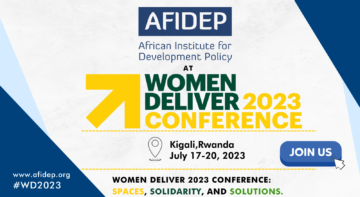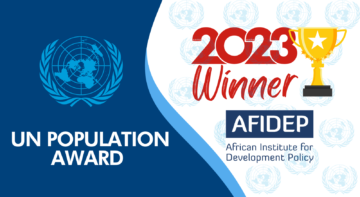Blogs

The demographic dividend paradigm has taken African policymakers by storm, with many government leaders eager to harness the opportunity presented by their countries’ youthful populations to increase economic growth and employment. The Demographic Dividend (DD) is the economic benefit that arises following a significant increase in the ratio of the working-age population relative to dependents (children and the elderly).
To this end, several countries have already undertaken studies to estimate the potential demographic dividend and to identify policy investment options for a maximum dividend. Surprisingly, only a few of these countries funded the studies, with UNFPA and other development organizations taking the financier’s role. The question that begs then is, is the demographic dividend an African driven agenda, or is it one of the many global population initiatives that developing countries, and in particular African countries, align themselves to tap into the international funding boom?
In this reflective piece, I take a journey through history, on various well-intended global population initiatives whose implementation was not optimum due to limited ownership and funding by African governments and relate this to the demographic dividend paradigm.
Global population conferences and forums have generated key initiatives aimed at improving population and development outcomes, mainly in developing countries. The First World Population Conference organised by the United Nations in Rome in 1954, is credited with establishing the role of international donors and other significant actors in influencing population issues, a role that has grown immensely in the time since then. The Third World Population Conference in Bucharest, Romania in 1974 adopted an inter-governmental nature, and population issues in developing countries have come to take centre stage in these conferences, with governments committing to implement programmes as per the conference plan of action. Of all forums on population and development issues held in recent history, the most impactful was held in 1994 in Cairo. Unlike the previous conferences, the 1994 International Conference on Population and Development (ICPD) was a turning point in population policy perspectives as it shifted the emphasis away from slowing population growth to improving the lives of individuals, particularly women. The ICPD programme of action (PoA) emphasised on the steadfast relationship between population and development and focused on meeting the needs of individuals within the framework of universally recognised human rights standards. The conference ended with an unprecedented international consensus on interventions for the next 20 years.
Although African countries were initially wary of the population priorities of the North drawing away international funds from other developmental goals of the South, they endorsed the PoA. This came with the realisation that funding was dictated by the PoA, and, therefore, to benefit from the donor funding, government priorities were shelved for the sake of international priorities. Lack of ownership was thus the biggest bottleneck to the implementation of global commitments. For example, although population policies were developed since the 1980s in most African countries, fertility rates have remained high, and uptake of modern contraceptives has lagged behind levels in other global regions.
Endorsing the PoA meant that African countries could receive international funding to help with their staggering economies, but it also meant that minimal government resources were committed to ensuring successful implementation of these programmes. Even in recent global commitments including the Millennium Development Goals (MDGs), the FP2020 and the Sustainable Development Goals (SDGs), it’s become clear that African governments are not meeting their end of the bargain on resource allocation. The fact that most family planning programmes are heavily donor reliant, and that midway towards the end year, the FP2020 progress is below expectations speaks volumes about commitment from African governments.
The demographic dividend framework, contrary to previous global population initiatives, is very close to the hearts of African leaders because it resonates well with prevailing development challenges of unemployment and a vibrant but poorly-skilled youthful population. As such, a series of deliberations and initiatives, driven by the African Union, have called on African countries to embrace the demographic dividend as a central framework for accelerating equitable and sustainable development across the continent. The African Union, to underscore the centrality of the dividend in development planning processes, designated the theme of 2017 as “Harnessing the Demographic Dividend through Investments in the Youth” and launched a roadmap in 2016 with key deliverables and milestones to guide the Member States on concrete actions to be undertaken to harness the dividend.
Following this call, several countries have moved to operationalise and domesticate the demographic dividend. Since 2014, the African Institute for Development Policy (AFIDEP), in partnership with UNFPA and other development partners, and government ministries, has conducted studies in 12 countries in Eastern, Southern, and West Africa. Although these studies are largely driven and owned by government ministries, only a few of these governments have committed funds to move the demographic dividend agenda forward. Some countries have developed roadmaps to guide the implementation of the demographic dividend (Nigeria, Kenya, Uganda etc.), while others like Uganda and Zambia have integrated the demographic dividend principles into the national development plans. Kenya has gone as far as costing its roadmap. Although these are big steps in the right direction, it’s not clear how these roadmaps will be financed.
Even as I acknowledge the myriad of challenges inherent in most African countries, a lot more can be achieved by reorganisation of investment priorities, and much more by addressing rampant corruption, and ensuring effectiveness, efficiency, and accountability in use of public resources and delivery of services.
Given the benefits associated with the demographic dividend framework, our expectation is that governments will take a front seat in funding the framework. Otherwise, the demographic dividend will end up being a mere development buzzword, with no tangible action and benefits for most countries. African governments have to rise to the occasion and demonstrate that they have come of age in taking charge of their development priorities. This will only happen if they put their money where their mouths are!
Related Posts





